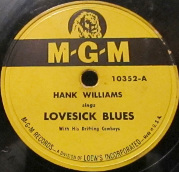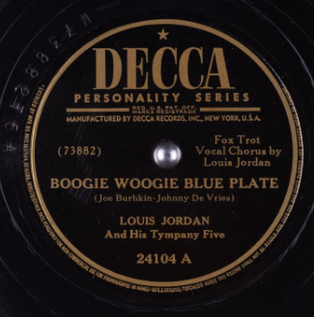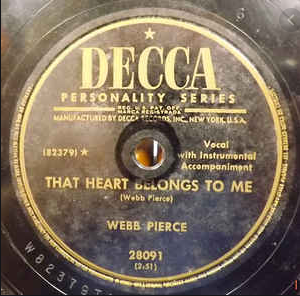Related Research Articles

Clarence Eugene "Hank" Snow was a Canadian-American country music guitarist, singer, and songwriter. He recorded 140 albums and charted more than 85 singles on the Billboard country charts from 1950 until 1980. His notable songs include "I'm Moving On", "The Golden Rocket", "The Rhumba Boogie", "I Don't Hurt Anymore", "Let Me Go, Lover!", "I've Been Everywhere", and "Hello Love", as well as others.

Clyde Julian "Red" Foley was an American musician who made a major contribution to the growth of country music after World War II.
"Wheel of Fortune" is a popular song written by Bennie Benjamin and George David Weiss and published in 1951. It is best remembered in the 1952 hit version by Kay Starr.
"Jambalaya (On the Bayou)" is a song written and recorded by American country music singer Hank Williams that was first released in July 1952. It is Williams' most recorded song. Named for a Creole and Cajun dish, jambalaya, it spawned numerous recordings and has since achieved popularity in several different music genres.
"Tennessee Waltz" is a popular country music song with lyrics by Redd Stewart and music by Pee Wee King written in 1946 and first released in January 1948. The song became a multimillion seller via a 1950 recording – as "The Tennessee Waltz" – by Patti Page.
"(It's No) Sin" is a popular song with music by George Hoven and lyrics by Chester R. Shull. It was a No. 1 song on Billboard charts released by Eddy Howard in 1951. This song should not be confused with "It's a Sin", another popular song of the same era.
"Half as Much" is an American pop standard song written by Curley Williams in 1951. It was recorded by country music singer Hank Williams in 1952 and reached number two on the Billboard Country Singles chart.

"Jingle Bell Rock" is an American Christmas song first released by Bobby Helms in 1957. It has received frequent airplay in the United States during every Christmas season since then, and is generally considered Helms' signature song. "Jingle Bell Rock" was composed by Joseph Carleton Beal and James Ross Boothe, although both Helms and session guitarist on the song Hank Garland disputed this. Beal was a Massachusetts-born public relations professional and longtime resident of South Ocean Avenue in Atlantic City, New Jersey, and Boothe was an American writer in the advertising business.
"Tell Me Why" is a popular song written by Marty Gold with the lyrics by Al Alberts. The song was published in 1951.
"Deep in the Heart of Texas" is an American popular song about Texas.

"Lovesick Blues" is a Tin Pan Alley song, composed by Cliff Friend, with lyrics by Irving Mills. It first appeared in the 1922 musical "Oh, Ernest", and was recorded that year by Elsie Clark and Jack Shea. Emmett Miller recorded it in 1925 and 1928, followed by country music singer Rex Griffin in 1939. The recordings by Griffin and Miller inspired Hank Williams to perform the song during his first appearances on the Louisiana Hayride radio show in 1948. Receiving an enthusiastic reception from the audience, Williams decided to record his own version despite initial push back from his producer Fred Rose and his band.
Mitchell Joseph Torok was an American country music singer-songwriter, guitarist, artist and author, best known for his 1953 hit record "Caribbean". He also wrote "Mexican Joe", which catapulted Jim Reeves to stardom. They began to write together and charted with many top 20 hits.

"Boogie Woogie Blue Plate" is a song written by Joe Burhkin and Johnny DeVries. It was performed by Louis Jordan and his Tympany Five and released on the Decca label.
"Fraulein" is a 1957 song written by Lawton Williams and sung by Bobby Helms. Released by Decca Records that year, "Fraulein" was Helms's debut single on the U.S. country chart, reaching #1 for four weeks and staying on chart for 52 weeks, the sixth longest song in country music history to spend over 50 weeks on the country singles chart. The song's popularity crossed over to the pop chart where "Fraulein" peaked at #36.

"Rock-A-Beatin' Boogie" is a 1952 song composed by Bill Haley and first recorded by the Esquire Boys in 1952. Bill Haley and the Comets recorded the song in 1955 for Decca. The song was featured in the 1956 movie Rock Around the Clock.

"I'll Be Home for Christmas" is a Christmas song written by the lyricist Kim Gannon and composer Walter Kent and recorded in 1943 by Bing Crosby, who scored a top ten hit with the song. Originally written to honor soldiers overseas who longed to be home at Christmas time, "I'll Be Home for Christmas" has since gone on to become a Christmas standard.

"That Heart Belongs to Me" is a country music song written and recorded by Webb Pierce. It was released in 1952 on the Decca label. In June 1952, the song reached the No. 1 spot on the Jockey chart. It peaked at No. 2 on the Juke Box chart and No. 5 on the Best Seller chart. In Billboard's year-end country chart for 1952, it ranked No. 20.
These are lists of Billboard magazine's "Top Country & Western Records" and "Top Country & Western Artists" for 1950, ranked by retail sales and juke box plays.
These are lists of Billboard magazine's "Top Country & Western Records" for 1951, ranked by retail sales and juke box plays.
References
- ↑ "The Rhumba Boogie lyrics chords | Hank Snow". Classic-country-song-lyrics.com. Retrieved 3 May 2021.
- ↑ Whitburn, Joel (2004). The Billboard Book Of Top 40 Country Hits: 1944-2006, Second edition. Record Research. p. 322.
- ↑ Billboard, April 28, 1951, p. 84
- ↑ "DECCA (USA) 78rpm numerical listing discography: 46000 series". 78discography.com. Retrieved 3 May 2021.
- ↑ Billboard, March 31, 1951, p. 19 Decca "New Releases Available for Immediate Shipment"